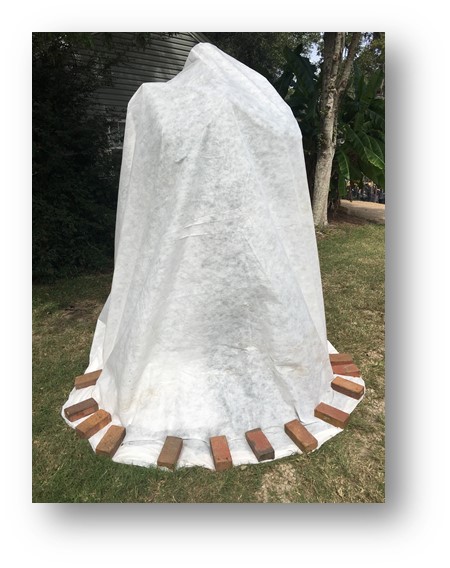In a few days we’ll be getting the full effect of “winter wonderland” with temperatures ranging from 26°-35°F. In case you’re wondering when or how you should protect your plants from a freeze, keep reading for more Florida friendly tips.
Volusia County reports indicate a significant freeze impacting our area beginning Friday and hopefully wrapping up by Tuesday. Wind chills are expected to be 5° lower than the projected temperatures. Cold temperatures damage the xylem, phloem, and cambium by restricting the movement of water and nutrients through the cells. Cold weather can ultimately kill plants by damaging the way they transport nutrients and water.
So what do you for your plant friends?
Retain Heat: add mulching material around your plants to retain heat. If you have plants in containers, group the containers together and cover with a fabric covering. AVOID PLASTIC as it can damage the plant if it touches the foliage. Apply covers that touch the ground and can be secure with bricks, pavers, tent weights, etc. The goal is to keep as much heat stored around the plant as possible so make sure you reduce the opportunity for air to creep in or blow away the covering all together.

Water: adding water before and after a freeze will help thaw frozen soils and refresh plants. Moist soils tend to absorb more heat. Avoid overwatering or saturating plants at any time as this will damage the roots.
Post Freeze Maintenance: remove all coverings immediately to allow heat to radiate through the plant. You can water to your plants at this time as well but focus on watering the roots, not the leaves of the plant. You may have a few leaves showing cold injury signs, you can prune them. Best practice is to wait until our last bout of cold weather BEFORE pruning anything “dead” material on your plants. Many plants will recover just fine from a freeze. Pruning plant material that is unsightly too early can lead to plant decline or dieback.
Covered with Love: Plants such as orchids, Ti plants, tropical fruit trees, tomatoes, peppers, zinnias, and pentas are cold sensitive and will need to be covered with plenty of love. Plants that tolerate cold weather better consist of collards, kale, carrots, broccoli and cauliflower, snapdragon, pansy, coreopsis, and many natives.
Resources:
https://edis.ifas.ufl.edu/publication/MG025
 0
0
